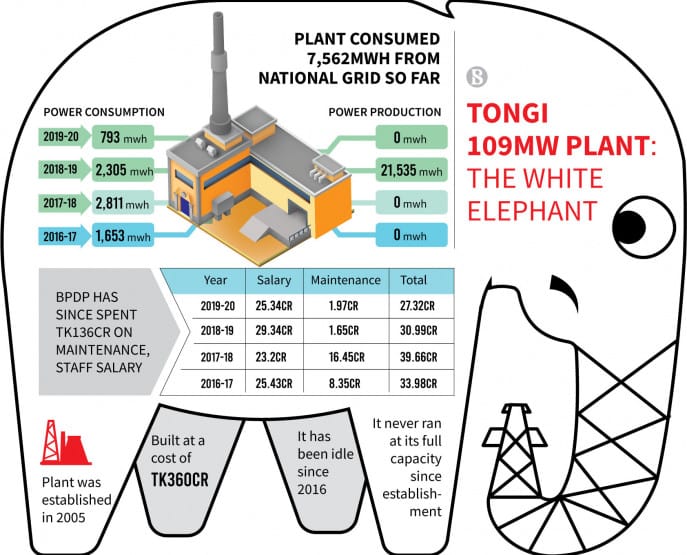The Tongi 109MW Power Plant has become a white elephant for the government, yet the power board has no plan to scrap it to prevent further waste of taxpayers’ money.
The Bangladesh Power Development Board (PDB) has spent Tk136 crore on the plant in the form of maintenance and staff salaries in the past four years as the plant has remained idle since 2016.
Besides the financial loss, the plant also consumed around 7,562MWh electricity worth Tk6.05 crore from the national grid during this period but has produced a very small amount of electricity.
Interestingly, the PDB is still optimistic about reopening its plant – which experts have rejected outright.
“We cannot run the plant because of gas shortage. But it will be operational again once energy supply increases in the gas distribution line from the liquefied natural gas [LNG] terminal,” said Engineer Md Belayet Hossain, chairman of the PDB.
But Petrobangla officials opposed the PDB chief’s stance, saying faulty machinery, not gas supply, is the main problem of the plant.
They also said natural gas is already available in Tongi and if the PDB was capable, it would have already run the plant.
Engineer Md Kamruzzaman, director (operation and mines) of Petrobangla, told The Business Standard that they are currently supplying around 1,400 million cubic feet (mmcf) of gas per day to all gas-based power plants, whereas the Tongi plant needs only 16mmcf per day.
“If we could supply such a bulk amount of gas, then is it a big matter for us to supply 16mmcf?” he countered the PDB chairman’s statement.
Echoing Petrobangla’s statement, energy experts also opined that faulty equipment, not gas supply, is the key factor behind the plant’s idleness.
They suggested the authorities abandon the plant as soon as possible to stop further waste of public money – a view shared by some PDB officials as well.
Dr Mohammad Tamim, a professor of petroleum and mineral resources engineering at Bangladesh University of Engineering and Technology, said, “The Tongi plant is one of the corrupt plants in the country. Rather than incurring losses year after year, the government should abandon it completely.”
The Tongi power plant – built in 2005 at a cost of Tk360 crore – represents corruption, bad planning and sheer waste of public money. As the contractor allegedly managed the job by bribing some PDB officials, the power ministry and Khaleda Zia’s elder son Tarique Rahman’s alternative power house known as Hawa Bhaban during the BNP-Jamaat alliance government.
In counter to the PDB chairman’s statement, he said the plant would not be able to produce the required level of electricity even if it got enough gas supply.
“This is because the equipment used in the plant does not match the original specification. Generating electricity using faulty equipment is unrealistic,” he added.
Energy Adviser to the Consumer Association of Bangladesh Professor Dr M Shamsul Alam said like other concerns on a losing trend, the government should shut down the plant because such plants increase electricity generation cost.
“The PDB should not keep such plants in its system just to claim a higher power generation capacity. Such losing plants contribute to the energy price hike,” he added.
One of its two GBCs broke down in 2017 and was sent to Kolkata for repair. It was returned in late 2019 after which it broke down again. As a result, the plant always remains under maintenance rather than producing electricity.
When contacted, Md Imrul Hossen, current manager of the plant, said they were still carrying out maintenance.
“Work is progressing, though the pace has slowed down due to Covid-19. Despite that, we are continuing work,” he said.
A case was filed with the court and an inquiry was held during the military-backed caretaker government that found that the company supplied sub-standard equipment including gas and air compressors, gas booster compressors (GBC) that increases gas pressure.
Sorry state of the plant
Usually, the life span of a gas-fired power plant is a minimum of 25 years. During this period, a plant has 80-90% annual plant factor – a term that refers to the utilisation of a plant in a given period.
Although plant factor decreases when a plant gets older, that of Tongi plant never went beyond 55%.
Its best-performing year was 2007-08 when it had a not so stellar record of running only at half its expected capacity. Since then, it had run at a dismal 12-30% capacity.
In 2017-18, it remained completely idle and not a single megawatt of electricity was generated. Rather, it consumed 2,811MW from the national grid to keep its machinery active and offices lit throughout the year.
In that financial year, the PDB spent over Tk39.66 crore on the plant – Tk16.45 crore for maintenance and Tk23.21 crore for salary and allowances.
In the previous fiscal year (FY17), the plant remained inoperative as well and consumed 1,653MW from the national grid. That year, the government spent Tk33.98 crore – Tk8.35 crore for maintenance and Tk25.43 crore for payment of salary and allowances.
It is expected that a new power plant should have 40-45% efficiency – a ratio of power generated from the use of a certain quantity of gas.
But before becoming an inoperative plant, the Tongi facility had only 26% efficiency, which also led to its poor plant factor.

